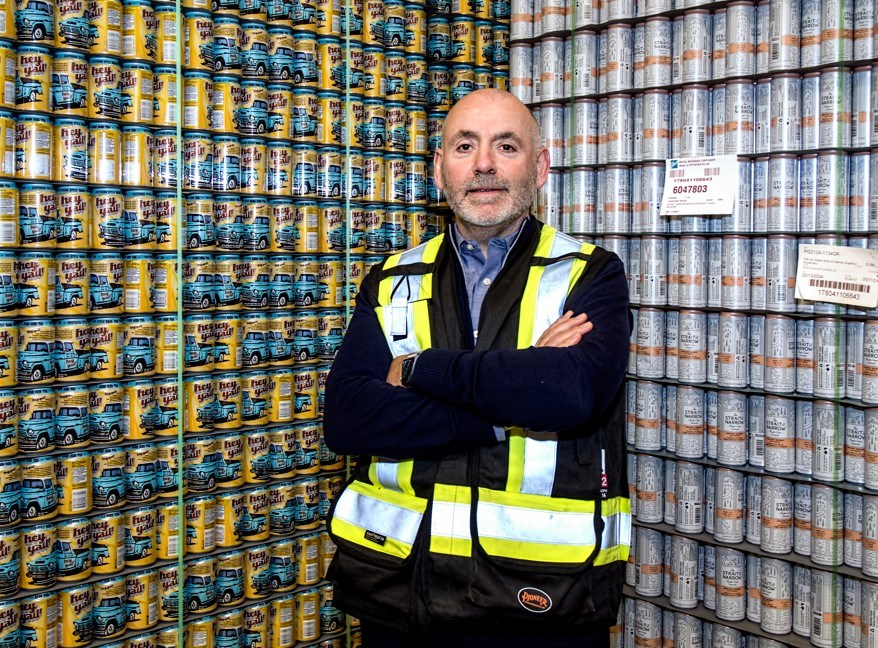Angst in the brewery sector about rising and potential U.S. tariffs and Canadian retaliatory tariffs is amplifying a call to allow aluminum can manufacturing on B.C.’s agricultural land reserve (ALR).
No such manufacturing takes place in the province.
That means brewers and other drink manufacturers that package drinks in cans in B.C. must import them.
"Think about how many cans you consume in a year," said Darryll Frost, who remains the owner of Surrey-based Central City Brewing and Distillers Ltd. until a court-approved sale to Anthony von Mandl's Mark Anthony Group closes, likely later this month.
"None of those cans come from here. Think about the ecological footprint of that. Think about the economic footprint of that. It makes no sense. There needs to be a can manufacturing site in B.C."
Brewers' options for where to buy cans include Ball Corp. in Ontario, Crown Metal Packaging in Calgary or Ardagh Metal Packaging in the U.S.
Another option is to buy from a second company that Frost owns: ALNA Packaging, which is a brokerage that buys and sells beverage cans that are made almost exclusively in Asia.
He told BIV that he annually imports about one billion aluminum cans from Asia, with most of those coming from China. He then resells them to drink manufacturers across North America.
He has long lobbied the B.C. government to allow him to build an aluminum-can manufacturing plant on B.C.’s ALR land.
Doing so would bring down the cost of those cans for B.C. businesses that make beer or other beverages and need packaging, he said. That is because shipping the cans from Asia is expensive.
Frost’s renewed call for the government and Agricultural Land Commission (ALC) to allow can manufacturing on ALR land is coming now because tariffs proposed by U.S. President Donald Trump, and likely Canadian retaliatory tariffs, have the potential to increase the cost of aluminum cans for brewers who buy cans made in the U.S.
Trump for months has threatened to impose a 25-per-cent tariff on all Canadian imports, except for energy, which would carry a 10-per-cent tariff. Those tariffs are on pause until at least March 4, both governments have said.
Any new U.S. tariffs on Canadian imports would likely spur new Canadian tariffs on U.S. imports.
Canadian brewers would be caught in the middle. They might import U.S.-made aluminum cans and could therefore face retaliatory Canadian tariffs on that packaging. Any finished-product exports to the U.S. would then be dinged with Trump's 25-per-cent tariff.
Brewery owners have said they fear that a tariff war will cut profit margins and potentially lead to business failures.
“Luckily, in BC we have access to Chinese cans, but they cost a lot to ship overland,” Ben Coli, who owns Burnaby's Dageraad Brewing, wrote on social media platform Bluesky.
He added that any tariff war could have dire consequences.
“This is going to suck for a lot of Canadian brewers," he said.
Some good news is that when the Canadian government earlier this month listed a wide range of U.S. imports on which it would levy retaliatory tariffs if U.S. tariffs on Canadian imports go into effect, that list did not include aluminum.
That could, of course, change.
Barley grown in the U.S. would be subject to Canadian retaliatory tariffs, according to the government's initial list. Frost, however, said Central City Brewing and many B.C. craft brewers use Alberta-grown barley.
Retaliatory tariffs on U.S. aluminum cans would not add a substantial cost to a four-pack of beer, but it could be enough to sway consumer behaviour, Coli added on Bluesky.
“Tariffs aren't going to add $1.00 to the packaging cost of a 4-pack, it might be more like 20 or 30 cents,” he wrote. “Most consumers won't switch to growlers, they'll switch to cheaper beer from bigger breweries.”
ALR land said to be best place for can manufacturing
All ALR land is not created equal.
Some is prime land valuable for growing crops. Other ALR land is used for what Frost calls “infill.”
The low-grade ALR land is where Frost said he would like to build a 400,000-square-foot manufacturing facility on about 16 acres.
Industrial land in the province is not ideal because it either costs too much or it is challenging to find a suitable large footprint, he explained.
The provincial government has been slow to make any ALR regulatory changes while it embarks on a strategy that Premier David Eby said includes creating “agri-industrial zones."
Essentially that means that the province works with local governments to identify specific areas in the ALR where industrial-scale processing can take place. It then allows that manufacturing when the processed products are primarily from agricultural output.
Any change to allow non-food-related manufacturing, and not agriculture or food-related manufacturing, on the ALR would be controversial and attract opposition.
This also may not be the best time for Frost to be embarking on such a big initiative.
Building the project could involve financing a $200-million plant with $100 million in equipment and another $50 million needed to launch operations. That is a pricey project even if he has investors lined up.
Also, his other main business, Central City Brewing and Distilling Ltd., entered creditor protection last year.
"I'm licking my wounds, and I have to think carefully about my next steps," he said.




